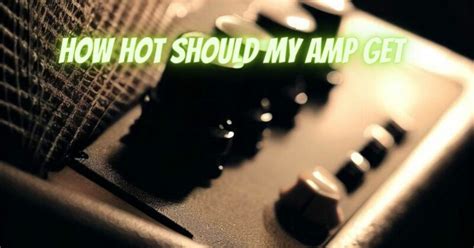How Hot Should An Amp Get
Ronan Farrow
Apr 04, 2025 · 3 min read

Table of Contents
How Hot Should an Amp Get? A Guide to Safe Operating Temperatures
Amplifiers, the heart of any sound system, generate heat during operation. Understanding how hot is too hot is crucial for maintaining your equipment and ensuring its longevity. This guide will help you determine safe operating temperatures for your amplifier and what to do if it's overheating.
Understanding Amplifier Heat
Amplifiers produce heat as a byproduct of converting electrical energy into sound. This is a natural process, but excessive heat can damage internal components and lead to malfunctions or complete failure. Different amplifier types and designs will have varying temperature tolerances. However, there are general guidelines to follow.
Factors Affecting Amplifier Temperature
Several factors contribute to an amplifier's operating temperature:
- Power Output: Higher power output generally leads to more heat generation. Pushing your amp to its maximum volume consistently will significantly increase its temperature.
- Ambient Temperature: Hot environments increase the amplifier's internal temperature, making overheating more likely. Avoid placing your amp in direct sunlight or poorly ventilated areas.
- Ventilation: Proper airflow is critical. Ensure your amplifier has adequate ventilation, allowing cool air to enter and hot air to escape. Don't obstruct ventilation slots.
- Component Quality: High-quality components are designed to handle heat more effectively. Cheap components may overheat more easily.
Determining if Your Amp is Too Hot
There's no single magic temperature number. Instead, rely on these indicators:
- Touch Test (Caution!): Carefully touch the amplifier's casing. If it's uncomfortably hot to the touch (like you can't comfortably keep your hand on it for more than a few seconds), it's likely overheating. Warning: Use extreme caution. The amplifier's internal components may be significantly hotter than the casing.
- Unusual Noises: Excessive buzzing, crackling, or other unusual sounds can indicate overheating.
- Automatic Shutdowns: Many modern amplifiers have built-in thermal protection circuits that shut down the amp if it becomes too hot. This is a safety feature.
- Smell: A burning smell is a serious sign of overheating and potential damage. Immediately turn off the amp and unplug it.
What to Do if Your Amp is Overheating
If you suspect your amplifier is overheating, take immediate action:
- Reduce the Volume: Lower the volume to reduce the heat generated.
- Improve Ventilation: Ensure proper airflow around the amplifier. Consider adding a fan if necessary (but ensure it's properly secured and doesn't obstruct ventilation slots).
- Check the Surroundings: Ensure the amplifier is not in direct sunlight or a poorly ventilated area.
- Inspect for Obstructions: Make sure there are no obstructions blocking the ventilation slots.
- Consult the Manual: Refer to your amplifier's manual for specific temperature guidelines and troubleshooting advice.
- Professional Help: If the problem persists, contact a qualified technician for repair or replacement.
Preventing Amplifier Overheating
Prevention is key! Here are some preventative measures:
- Regular Cleaning: Keep the amplifier's ventilation slots free from dust and debris.
- Appropriate Placement: Position the amplifier in a well-ventilated area, away from direct sunlight and heat sources.
- Don't Overdrive: Avoid consistently pushing your amplifier to its limits.
- Proper Wiring: Use appropriate gauge wiring to avoid excessive heat generation from power loss.
By following these guidelines, you can ensure your amplifier operates safely and efficiently, providing years of reliable performance. Remember, always prioritize safety and consult a professional if you have any concerns.
Featured Posts
Also read the following articles
| Article Title | Date |
|---|---|
| How Do You Stop A Runaway Diesel | Apr 04, 2025 |
| How Do You Find A Good Cosmetic Dentist | Apr 04, 2025 |
| How Do Break Barrel Air Rifles Work | Apr 04, 2025 |
| How Do Bookstores Get Their Books | Apr 04, 2025 |
| How Firm Thy Friendship Shirt | Apr 04, 2025 |
Latest Posts
-
How Long Does I601a Approval Take
Apr 05, 2025
-
How Long Does Human Scent Stay In The Woods
Apr 05, 2025
-
How Long Does House Settlement Take
Apr 05, 2025
-
How Long Does Gyeon Wet Coat Last
Apr 05, 2025
-
How Long Does Gooseberry Take To Ship
Apr 05, 2025
Thank you for visiting our website which covers about How Hot Should An Amp Get . We hope the information provided has been useful to you. Feel free to contact us if you have any questions or need further assistance. See you next time and don't miss to bookmark.
